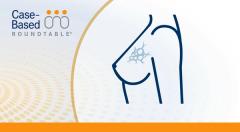
PFS Provides Rationale for Dato-DXd vs Chemo in HR+, HER2– Breast Cancer
Christos Vaklavas, MD, discusses the results of the TROPION-Breast01 trial of datopotamab deruxtecan in patients with metastatic breast cancer.
Episodes in this series

Christos Vaklavas, MD, associate professor and physician leader in breast cancer at the Huntsman Cancer Institute in Salt Lake City, Utah, discusses the results of the TROPION-Breast01 trial (NCT05104866) of datopotamab deruxtecan (dato-DXd) in patients with metastatic breast cancer.
The phase 3 open-label randomized study enrolled patients with hormone receptor (HR)–positive, HER2-negative metastatic breast cancer who had received endocrine therapy and 1 or 2 prior lines of chemotherapy to receive either dato-DXd or physician’s choice of chemotherapy. The primary end point of progression-free survival (PFS) was first reported as a median of 6.9 months for dato-DXd vs 4.9 months for chemotherapy (HR, 0.63; 95% CI, 0.52-0.76; P < .0001).
Vaklavas says that since it’s used in the same space as sacituzumab govitecan (Trodelvy) and partially overlaps with the data supporting a
TRANSCRIPTION:
0:08 | [This was] the randomized phase 3 clinical trial in breast cancer that randomized patients with HR-positive, HER2-negative metastatic breast cancer who have received at least 1 prior line of chemotherapy and have exhausted their endocrine options. It was a trial that pretty much followed the schema, if you will, of the DESTINYBreast04 [NCT03734029]; it [randomly assigned] patients to receive dato-DXd vs treatment of physician's choice…. The primary end point was the PFS. The median PFS was 6.9 months in the investigational arm with the dato-DXd vs 4.9 months with the treatment of physician's choice, an increment of 2 months. That was statistically significant, and this result was taken to the FDA, and to my knowledge, we're going to be anticipating approval of this agent sometime soon.
1:16 | What's important is to understand a little bit where this antibody-drug conjugate is going to go, how it is going to be incorporated in the clinical practice, in a field where we have sacituzumab govitecan and [trastuzumab deruxtecan] with the [trastuzumab deruxtecan]indication pretty much encroaching at some point into the [HER2] ultralow space. There are some toxicities of dato-DXd that are worth mentioning, which include...stomatitis primarily, which can be quite severe in the clinical practice. There is not, to my knowledge, a very good mitigation plan.












































